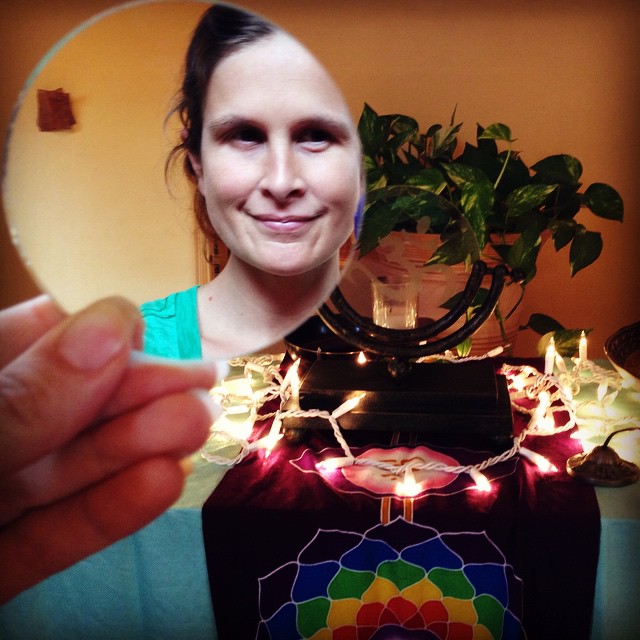Self-love is exactly what it sounds like. It is loving one’s self. What does it mean to love one’s self? It means to be kind, gentle, respectful, and caring as well as taking responsibility for and knowing oneself. Self-love is an essential component to loving others and being in kind, gentle, respectful, caring, and nurturing mutually beneficial relationships with the earth and all beings. We are only able to love others to the extent that we love our self. Simply put, it is having a high self- esteem and regard for one’s health and happiness, avoiding abusive, manipulative, violent, or toxic situations and relationships in order to experience a state of wholeness and connectedness. It is not self-love in the mistaken sense of being arrogant, narcissistic, vain, selfish, or having an unhealthy ego. Self-love directs us on the path to yoga, to feeling whole, happy, and complete—to realizing our true nature and the interconnectedness of all of life.
In Patanjali’s Yoga Sutras, Book 1, Sutra 33, the following advice is given for those on the path of yoga and self-love:
maitri karuna muditiopeksanam sukha dukha punyapunya visayanam bhavanatas citta prasdanam
By cultivating attitudes of love and friendliness toward the happy, compassion and empathy toward the unhappy (those who suffer), delight and joy in the virtuous and disengagement or equanimity to the unkind, angry, bitter, or resentful results in a calm mind.
This sutra not only applies to how we handle various situations and experiences with others, but also to how we relate to our self. Most of us have likely experienced being in an unhealthy relationship at some point in our life, whether with a friend, family member, co-worker, romantic partner, and so on. Getting into an unhealthy relationship and staying in it when we know it is damaging to our self and potentially others that are close to us is very common in our culture. We may even make excuses for or defend the behavior of the person with whom we have the unhealthy relationship. Those well established in loving themselves have the strength and a high self-esteem and sense of self-worth and are unlikely to get into an unhealthy relationship in the first place. Those on the path of self-love eventually realize the toxicity of the relationship they are in and are able to get out of it, no matter how difficult it may seem to be, ultimately moving forward in a positive way and breaking the cycle of the same suffering, in Sanskrit known as samsara. No more excuses, no more defending harmful behavior—loving one’s self enough to make healthy relationship choices with healthy boundaries, embracing the qualities of friendliness, compassion, empathy, delight, disengagement, and equanimity as suggested in this sutra. By practicing this sutra, we begin to love ourselves in a healthy way, which leads to having a higher self-esteem and making healthier decisions in how we relate to our self and others.
When dealing with a situation where someone is treating us without kindness, empathy, compassion, love, and so on, one of the most valuable things we are able to do is to ask that person in our own way to please love themselves more so they may love us. This may come in the form of spiritual practices, such as prayer, mantra, meditation, and/or direct communication with this other.
Many endure abuse, manipulation, or exploitation at the hands of those that claim they love them with those proclaiming the “love” unable to clearly see how they are treating that other, be it a human, pig, cow, chicken, horse, and the like. This abuse, manipulation, or exploitation may be verbal, physical, or passive aggressive, indirectly expressing hostility, anger, or blame, accusing another for our own unhappiness, which is ultimately due to a lack of self-love.
No one is able to make us happy, nor are we able to make another happy. Happiness is a choice. We are responsible for our own thoughts, words, and actions, which either contribute to our happiness and practice of self-love or take us further away. When we become the source of our happiness, or rather tap into that infinite source of happiness that is the universe and are in a state of self-love, then we are more fully able to love others and contribute to the health and happiness of the greater community. It all starts within. No outer change occurs until we have changed our self.
As a new mother I am reminded on a daily basis how important my practice of self-love is for baby Noah. In order for me to give the special care, nurturing, and love needed for my child to grow and be healthy, caring for myself is essential. For example, I make sure I am nourished with wholesome organic foods and well hydrated with pure water and juices so he is well fed physically and spiritually. I make sure that the environment I am in is peaceful, avoiding places where there is smoking, high alcohol consumption, or obscene and degrading music. And, I take into consideration the people I surround myself with, avoiding abusive, toxic, one-sided relationships and interactions with people that engage in gossip, put down others, or are hypocritical and insincere so I am protecting and creating a safe space for me and also for Noah.
As a culture, we are not loving ourselves enough, and that is mostly apparent in the dysfunction we see in the world—from experiencing fear, stress, anxiety, paranoia, frustration, or anger to breaking up of families and child abuse to eating disorders and eating the flesh and secretions of other beings, to war, suicide, and destruction and exploitation of the earth and other beings. Our capacities to love our self and others are not limited, though we have a tendency to limit them to a small circle, which means we have not fully engaged in or surrendered to 100 percent self-love. Not fully loving our self is what allows us to think, say and do harmful things to other beings and the planet.
A barometer to use for self-love is how we are treating others. When we are unkind or cause harm to others through our thoughts, words, or actions, it is an indication of not loving our self. Eating other beings is one of the most wide scale examples of the lack of self-love in our culture. Yoga, as well as other spiritual philosophies and teachings tell us that it is not possible to do harm to another without directly harming our own being.
Now, more than ever we are being called to love ourselves. Through cultivation of self-love we are able to more deeply connect with our unique gifts and purpose for being in the world. We are able to be more of service to our self and others and to live a more happy and joyful life. This is yoga.
A few suggested self-love practices:
- Take responsibility: No more guilt, blame, critical judgment, accusing or defending ourselves or others for our current situation. Take action to make healthier life choices.
- Don’t take things personally: Remember the saying: what others think of me is none of my business. And along with this, it is important we don’t compare ourselves to others.
- Get established in the art of letting go: Letting go is more than just forgetting. It’s truly resolving the past so we are able to have lasting happiness in the present. This is a simple, yet deeply profound mantra, Inhale: Let, Exhale: Go. What we are letting go of is that which we are not and that which keeps us from living in the moment. We let go of stress, tension, worry, fear, doubt, and so on … all the things that prevent us from being in our natural state of love, peace, and happiness. This mantra assists us with acknowledging that health and happiness is our natural state.
- Be for-giving: True forgiveness is to be for-giving, to be conscious of our actions, and see from the perspective of others, doing all we are able to uplift the lives of others. When we are for-giving, we are able to love and have empathy for those that have harmed or abused us in our past. Simultaneously have the self-love to not put ourselves in a situation where we may get harmed by those people in the future.
- Do things to increase self-esteem/self-healing: Meditate, get a massage, take a walk in the woods, practice asana (yoga postures), enjoy a Reiki session, experiment with aromatherapy, get engaged in a spiritual practice, connect with an uplifting community of people, and so on.
- Create or connect with satsang/community: To stay strong and courageous in the midst of stress, fear, anger, doubt, and violence, it is essential to connect and join together for the purpose of raising consciousness in ourselves and assisting others. This is satsang, keeping the company of those interested in the truth and associating with like-minds. Community is essential as none of us are able to do anything alone and positive group energy assists us with staying motivated and on track with our purpose.
- Chant mantra: Om Mani Padme Hum is a nice mantra for cultivating self-love. It translates as “Om, to the Jewel in the Lotus.” Hum is recited to invoke love and compassion. Repeating this mantra accumulates merit and eases negativity; meditating upon it is believed to purify the body and mind.
- Be kind: From Patanjali’s Yoga Sutras, Book 3, Sutra 24, we are reminded of the power of being kind. Maitri adishu balani: Through the practice of kindness to others, great strength comes. Our source of strength comes from practicing kindness to others. Essentially, give up the love of power for the power of love.
Other articles related to self-love:
Learning the Language of Self-Love
8 Ways to Protect Yourself From Emotional Manipulation
Empathic People are Natural Targets for Sociopaths – Protect Yourself
Anna Ferguson, World Peace Yoga teacher is passionate about yoga as a lifestyle and bringing the yogic teachings into all aspects of life from how we choose to communicate to what we eat and loving all beings.

